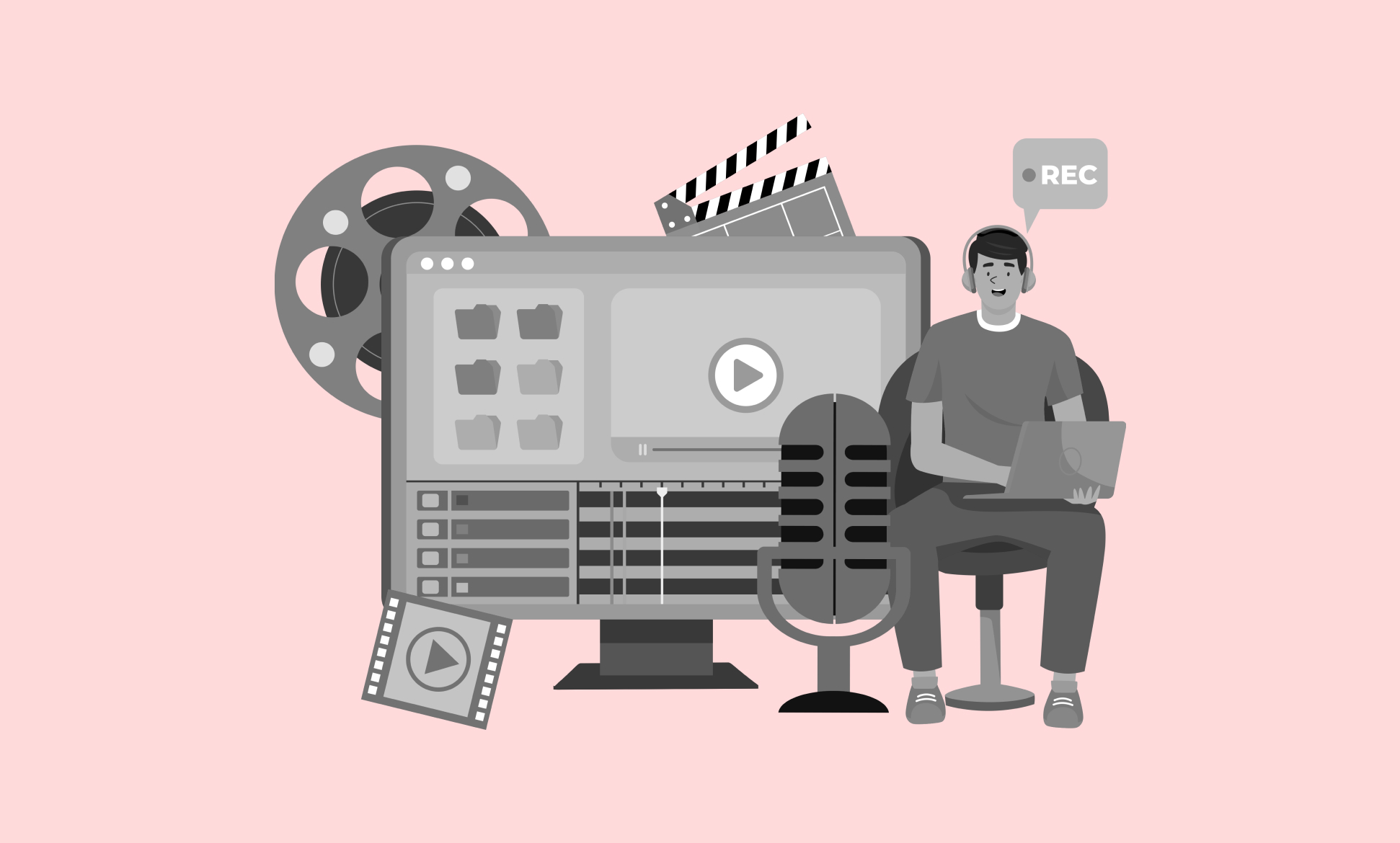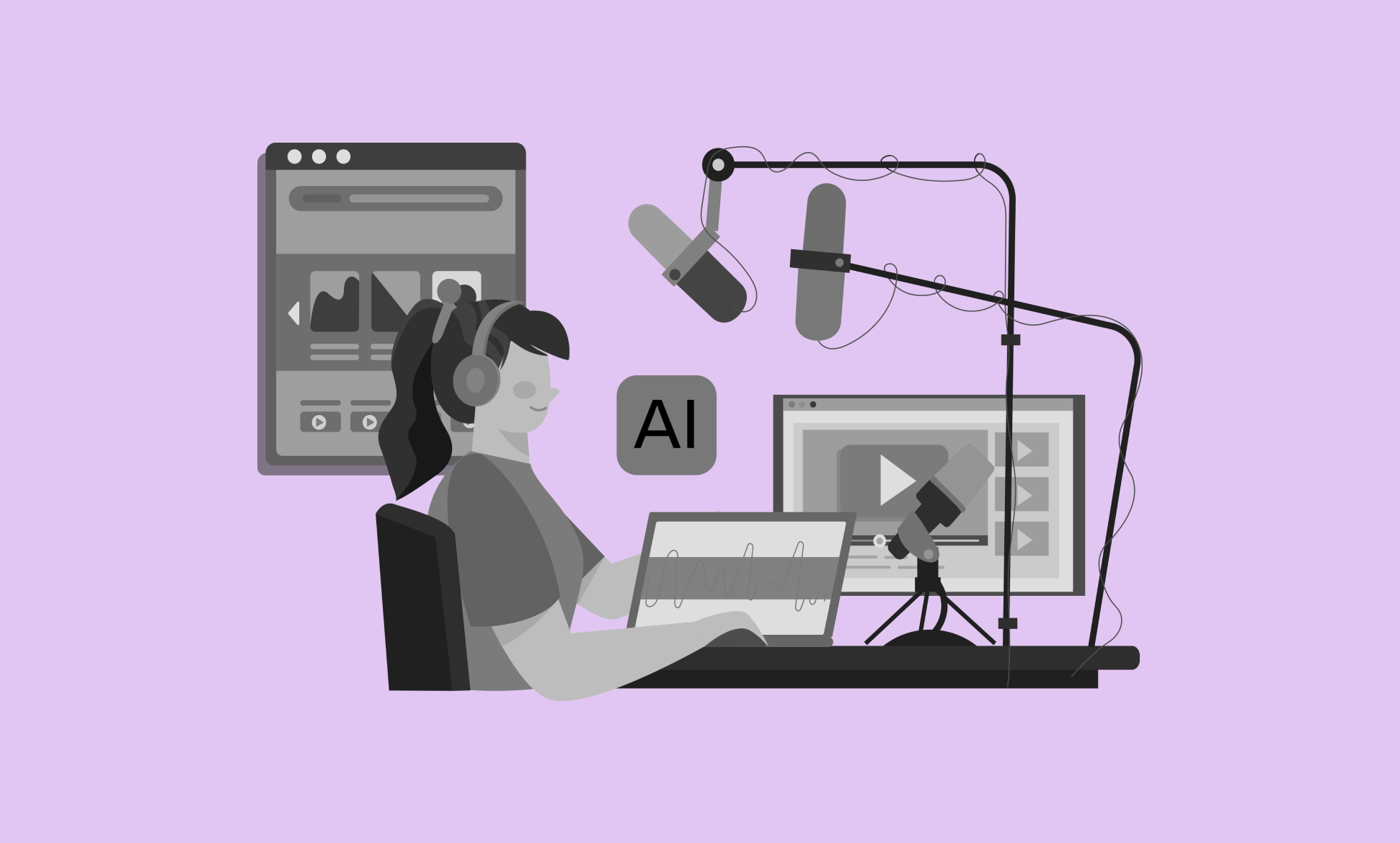Imagine turning your passion for storytelling, interviews, or your niche expertise into a full-time job. The good news? It's not as daunting as it might seem. You've already laid the foundation with your podcast; now it's time to harness its potential to generate income
The podcast industry is currently sitting at 25.85 billion in 2023 and is expected to reach 130.63 billion by 2030, which goes to show there’s never been a better time to get in on the action.
With a nearly $26 billion price tag attached to it, the podcasting world is evidently a lucrative business to get into. But how are all these entrepreneurs, creators, and brands cashing in on the podcasting biz, exactly?
In this comprehensive guide, we'll cover the ins and outs of podcast monetization. From proven strategies to effective methods, we've got you covered.
Let’s get into it.
By the numbers: podcast advertising
For one thing, podcast advertising is a massive market. In July 2023, the top three podcast advertisers were:
- BetterHelp, who spent $9.2 million
- Amazon, who spent $7 million
- Hello Fresh who spent $5.5 million
This should give you a sense of just how much cash is flowing in the world of podcasting at any given time.
Podcast ad slots can cost advertisers a pretty penny, with most of them selling on a CPM basis, meaning “cost per mile” or per 1,000 listeners. The industry standard for these ad slots can range anywhere from $18 to $50 CPM, which can get pricey when it comes to shows that are high in certified downloads.
In any case, there’s money to be made in the podcasting world.
Let’s dig into some of the most common and accessible monetization strategies for podcasters today.
1. Partner with brands for sponsorships
A great way to monetize your podcast or your entire brand, for that matter, is to partner with other brands to help promote their products or services through your content.
Of course, there’s a fine art to this, and some podcasters have a more refined style than others.
It’s all about working the brand mention into your show in a subtle and believable way so your listeners don’t feel like they’re listening to an ad, but rather an actual recommendation from a friend.
But let’s cross that bridge when you come to it: first, how do you land the brand sponsorships anyway?
Here are a few different avenues you can take to get there:
Sign up with an influencer or podcast marketing agency
Once you’ve amassed a solid following on social media and a certain number of downloads on your podcast, you may be able to work with an influencer or podcast marketing agency to help land brand sponsorships and work out the logistics of contracts, payments, and more.
Here are some options:
Approach brands
Another route is to approach the brands you genuinely love yourself to ask them about working together in the future. They may say no, but they may also say yes, too, so it’s worth a try.
Approaching brands for sponsorships for your podcast can be a lucrative way to monetize your content and grow your show's reach. However, it requires a strategic approach.
Here's a step-by-step guide on how to approach brands for podcast sponsorships:
Understand your audience:
Before you approach any brand, you must have a clear understanding of your podcast's audience. Who are your listeners? What are their demographics, interests, and buying behaviors? This information will help you identify which brands would be the best fit for your podcast.
Create high-quality content:
Ensure that your podcast consistently produces high-quality, engaging content. Brands are more likely to sponsor a podcast that has a strong and loyal listener base.
Build a solid listener base:
Focus on growing your podcast's audience. Higher download numbers and engagement rates make your podcast more appealing to potential sponsors. Promote your podcast through social media, email marketing, and collaborations with other content creators.
Identify relevant brands:
Look for brands that align with your podcast's niche and appeal to your target audience. For example, if your podcast is about technology, tech-related companies would be a natural fit. Make a list of potential sponsors.
Craft a compelling pitch:
Your pitch to potential sponsors should be professional and persuasive. It should include:
- An introduction to your podcast, its content, and its audience.
- Data on your podcast's performance, such as download numbers, listener demographics, and engagement metrics.
- A clear explanation of how a sponsorship would benefit the brand, including how you plan to promote them and integrate their messaging seamlessly into your content.
- Pricing and sponsorship package options.
Personalize your outreach:
Don't send out generic pitches to every brand on your list. Customize your pitch for each brand, showing them that you've done your homework and understand how their product or service aligns with your podcast.
Engage through multiple channels:
Reach out to potential sponsors through multiple channels, including email, social media, and networking events. Building a relationship with the brand's marketing or sponsorship team can increase your chances of success.
Remember that building a successful podcast and securing sponsorships takes time and effort. It's essential to maintain authenticity and provide value to both your listeners and sponsors to create a win-win situation for all parties involved.
2. Sell Ad Spots
As we’ve already mentioned, advertising represents a massive chunk of the podcast monetization game. In general, there are two different types of podcast ads:
Host-read ads
A host-read ad is exactly what it sounds like – an ad slot that’s read by the host of the podcast. Typically, a brand will send a podcaster a sample of their product or service, and the host of the podcast will draft a short testimonial about the product to be read during the episode.
Dynamically inserted ads
On the other hand, dynamically-inserted ads are ad spots that are recorded separately from the podcast episode by a voice actor or someone else who isn’t the podcast host. This is often referred to as the “creative,” and it’s inserted into the podcast episode during the post-production phase.
There are several ways to work with advertisers and make money off your show. One of the easiest ways to sell ad spots on your podcast is by applying to join an advertising network.
Most of these networks have a minimum requirement for listeners, downloads, etc., so you’ll want to make sure you’ve grown your audience to a solid place before you apply. Here are some of the best podcast advertising networks to check out:
3. Create a paid membership platform
Many podcasters and creative types are completely averse to the idea of selling ad spots since they believe it could take away from the quality of the content (although we disagree). If you feel this way, then a private membership group or platform may be one of the best ways for you to monetize your brand.
If you’ve built a devoted and loyal fanbase by offering compelling content that helps people in some way, whether that’s by providing advice, information, or just entertainment, there’s a good chance they’ll pay a small fee to access your content each month.
You could move all your content to a paid platform, or just bonuses, extras, and special product offerings like courses or eBooks.
To do this, you could try one of the following options:
Create your own private membership platform
Again, if you’re all about having 100% creative control over your brand, then it could be worth the added cost to work with an app or web developer to create a private membership platform that’s completely customized to your brand, style, and needs.
Once it’s up and running, you’ll charge subscribers a monthly fee to be a part of your community and gain access to special content, freebies, and promotions.
Use a tool like Patreon
With Patreon, creators have access to a turnkey solution for creating their own membership platform.
About 228,000 creators have joined Patreon as a way to monetize their businesses and promote their art, products, or service offerings. Anyone from podcasters to writers to visual artists to reiki healers can join, and the platform only takes 5-12% of your monthly earnings as the fee for using the platform.
Other sites that can help you monetize your podcast by creating an online membership platform include Memberful, Supercast, and Glow.
As of August 2023, Patreon has collaborated with Spotify, allowing all creators to offer patron-only content to Spotify listeners right where they’re already listening to their favorite audio content.
4. Sell content, courses, and other products
A great way to monetize your podcast is to sell merchandise, products, services, or really, whatever your heart desires.
Once you’ve built a solid following through your podcast, you’ll be able to leverage this community by offering them tangible products and services as an extension of your brand.
Whatever you’re selling, it doesn’t necessarily have to be related to your podcast content. If you have a devoted and loyal fanbase who appreciates the authentic content you release through your podcast, there’s a good chance they’ll love the same things you love and feel compelled to purchase them through you.
Essentially, once you’ve built trust and credibility in your community, you have more freedom to experiment with new tactics and launch exciting new offerings.
Here are some ideas for products, services, and merchandise you could sell via your website or even an Etsy shop:
- Premium bonus content: This could include extra-long interviews, never-before-seen footage, special tutorials, etc.
- eBooks: If you’re a fan of writing, try penning an eBook about the same topics you discuss on the podcast.
- eCourses: Similarly, if your podcast is educational and informative, try compiling the best advice and tutorials into a series of videos to sell as a course bundle. You could also use an online service like Thinkific to put together a snazzy course for your followers to purchase.
- Merchandise related to your show: like mugs, t-shirts. Because who couldn’t use more mugs and loungewear?
- Merchandise unrelated to your show: like jewelry, candles or whatever you’re into. Again, whatever you’re selling doesn’t necessarily need to be related to your content. Maybe you chat about spirituality on your podcast but you also happen to make pottery on the side—whatever you’re good at, there’s a good chance you can find a way to turn it into regular income.
5. Monetize on YouTube
This monetization strategy is pretty straightforward, so it’s definitely an easy way to top up your monthly income that you won’t want to miss out on.
Plus, in 2023, nearly a third (32%) of Americans prefer listening to podcasts with video — increasing to 46% among podcast listeners who listened to a podcast within the last month.
All you have to do is upload your podcasts to YouTube, click “enable monetization” under “status and features,” and let the platform do the rest.
You don’t even necessarily have to pair your podcast content with video—a simple graphic image to act as the visual aspect will do the trick. But also note, that this strategy requires a very high audience volume to effectively monetize your show.
6. Take advantage of podcast fame
As we’ve already covered, once you’ve built a devoted and loyal fanbase and increased your brand exposure, the world is pretty much your oyster as far as monetization strategies go.
Having a popular online platform is a great way to land other opportunities you may not otherwise have access to.
If you’ve amassed a solid amount of listeners, downloads, and followers through your podcast, don’t be shy—take advantage of your newfound fame by leveraging other opportunities in your community and abroad. Some examples may include:
Speaking engagements and events
If people like listening to your podcast, chances are, they’ll pay to see you speak live and in person at conferences, events, and more.
Organizing a speaking engagement for a podcast host with a large following requires careful planning, effective promotion, and a focus on delivering valuable content to engage and retain the audience.
Here are some factors to consider before making the leap:
- Define the purpose and goals: Set goals for the event, such as increasing podcast listenership, building a brand presence, or establishing the host as an authority in their niche.
- Select the format: Decide on the format of the speaking engagement. Options include webinars, live podcasts, virtual panel discussions, in-person events, or a combination of these. Consider what best suits the host's style and the audience's preferences.
- Choose the topic and content: Select a topic that aligns with the podcast's niche and the host's expertise. Ensure the content is relevant, engaging, and provides value to the audience. Plan the structure of the event, including key points, anecdotes, and any visual aids or presentation materials.
- Secure a venue or platform: If it's an in-person event, secure a suitable venue well in advance. Ensure it can accommodate the expected audience size and has the necessary technical equipment. For virtual events, choose a reliable platform for hosting webinars or live streams. Popular options include Zoom, Webex, or streaming on social media platforms.
- Promotion and marketing: Create a marketing strategy to reach the podcast host's existing followers and expand the event's reach. Utilize social media, email newsletters, and the podcast itself to promote the event. Consider using paid advertising to boost visibility. Create a dedicated event webpage or landing page for registration and information. You can even invest in conference swag.
- Technical setup: Ensure all technical aspects are in order, especially for virtual events. Test audio, video, and internet connectivity well before the event starts. Prepare any slides, visuals, or interactive elements that will be part of the presentation.
Teaching classes
As we’ve already noted, selling products and services such as coaching, teaching, healing techniques and more is a great way to monetize, depending on your skills and expertise.
Since you’ve already built a following, people will be much more inclined to take your advice than others about your niche – whether it be fitness, investing, or public speaking.
Private webinars
Holding private webinars online through Zoom or another video conferencing service allows you to reach a much broader audience base than in-person events. This gives you the chance to communicate with people all over the world in real time.
You can also record your websites and distribute them asynchronously for a discounted rate.
7. Just ask!
When it’s all said and done, sometimes the simplest way to make money is to just ask for it.
Many creators today will simply ask their followers and community to donate money through their brand’s website, GoFundMe, or a similar platform so they can keep their business going and raise funds for things like new podcasting equipment.
This is a pretty pure, simple, and honest way to make money, so it’s another great option if you’re advertising-averse.
Are you ready to monetize your podcast?
Turning your passion for podcasting into a profitable venture is an extremely rewarding and achievable journey with the right amount of persistence.
This ultimate guide has covered a wide spectrum of monetization strategies, from sponsorships and advertising to merchandise sales and premium subscriptions. Success in podcast monetization often requires a combination of these methods, a deep understanding of your audience, and consistent, high-quality content.
Remember, building a loyal and engaged listenership is the foundation upon which all monetization efforts rest. As you embark on this journey, keep experimenting, learning, and adapting to the evolving landscape of podcasting.
With dedication and creativity, your podcast can become not only a source of valuable content but also a sustainable income stream. If you’re looking for a good place to start, reach out to our team!











